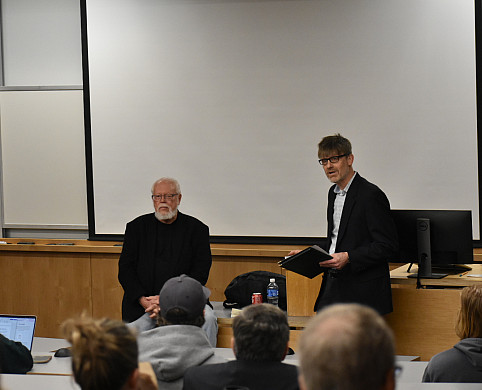Climate Resilience and Energy Transitions

Climate change affects every area of environmental practice from water rights and biodiversity to the resources we use for energy and transportation. Practitioners working in climate and energy issues must be knowledgeable in critical modern climate crisis issues, including adaptation, mitigation, and climate justice.
Energy lawyers and policymakers play a crucial role in advancing laws and policies as our world transitions to a new energy paradigm.
Coursework
The changing climate challenges our traditional notions of environmental and natural resources law and almost every environmental course at Lewis & Clark addresses aspects of climate disruption. Below are classes that are focused on issues relating to energy and climate.
This will be an experiential course in which students engage in legal problems that lawyers handle to develop practical skills that will be useful regardless of what practice area students eventually choose. In this summer course using environmental facts and laws applying to Professor Ferrey’s real-world ‘Modules’/problems, students represent different sides in different disputes representing NGOs, regulated companies, or government agencies responsible for clean air, developing applicable skills:
- Discerning the federal/state legal split as to which level of government can regulate what aspects of the environment
- Re-argue in class the most cited Supreme Court precedent this century (a Clean Air Act case) using the actual briefs from the case, with legal teams on both sides of the case
- Navigate recent Supreme Court restrictions on the ability of government agencies (EPA) to regulate U.S. air emissions that cause climate change
- Explore the revitalization of common law creates claims on air pollution and climate
- As a law firm, try to avoid our client NGO’s air claim against a government agency getting tossed out on procedural grounds that the U.S. DoJ raises against any NGO environmental litigant, and how we avoid that as well as to recover our attorney fees from litigation
This class takes an in-depth look at our greatest global environmental challenge, climate change, through a discussion of the international treaty regime.
It will begin with an overview of climate science and a discussion of the existing and expected impacts of climate change. Next, the course will discuss the United Nations Framework Convention on Climate Change (UNFCCC), the Kyoto Protocol, the Paris Agreement, and the associated Katowice rulebook. Time permitting, the course will discuss related hot topics such as climate and pipeline litigation and the role of non-state actors.
This class will discuss U.S. law and policy. It will begin with an overview of climate science and a discussion of the existing and expected impacts of climate change. Next, the course will discuss federal laws, regulations, and policies that regulate greenhouse gases and otherwise address climate change impacts. The course will then discuss state and local approaches to address climate change.
The class will also discuss climate change litigation in federal and state courts. Time permitting, the course will compare U.S. approaches to climate change law and policy in other countries.
Energy is fundamental to the operation of modern economies and to everyday life. It is a highly evolving and fast-changing area of law and policy, and therefore an exciting topic in modern legal studies. This course covers energy resource law and policy in the United States governing the production, transportation, consumption, and disposal of a broad variety of energy resources.
From this course students will be able to:
- Identify critical issues concerning the extraction and consumption of the world’s primary sources of energy: coal, oil, biofuels, natural gas, hydropower, nuclear, wind, solar, and geothermal energy;
- Assess the basic tension between free market trading of energy and government regulation;
- Analyze federalism issues and the division of U.S. regulatory authority governing energy production and use among federal, state, and local government authorities;
- Apply the energy trilemma of security, equity, and sustainability to a variety of energy sources and their use.
The first half of this course will focus on a broad range of energy sources, their extraction, production, transportation, consumption, and disposal. The second half of this course will focus on hot topics in energy law and policy that highlight the complexity of energy transactions involved in the clean energy transition, such as smart grid technology, development and siting of clean energy, and the role of nuclear energy. While the course provides a basic introduction to the electricity grid and looks at smart grid technology, it focuses on a broad range of energy resources. The course does not focus on the electricity grid or electricity rate-making, as these issues are covered in other courses such as LAW-336 Energy Law: Electricity Regulation.
The energy sector is currently evolving at a rapid pace as it grapples with climate change, swift technology advancements, changing customer expectations, and equity and environmental justice responsibilities. This class will introduce students to the fundamental energy sector laws and policies in the Northwest and throughout the Western United States, and how those laws and policies are transitioning to a new energy paradigm for the 21st Century.
We will examine the fundamentals of utility regulation, including ratemaking and resource planning, and energy markets. This background supports the exploration of the major new industry opportunities and challenges associated with decarbonizing the electricity grid and natural gas service, maintaining reliability, customer choice, and addressing equity and environmental justice responsibilities. We will look at major energy sector developments including evolving renewable technologies, rethinking the distribution and use of electricity, the role of federal power marketers, and the electrification of load away from natural gas usage.
Energy law and policy are evolving very quickly. This class is designed to emphasize practical understanding by studying actual issues before courts, agencies, and legislatures by using readings that are used and created by practitioners.
The Environmental Justice movement demands fair treatment in the context of environmental protection for all people, regardless of race, ethnicity, gender, religious affiliation, economic status, national origin and education level. It looks at environmental issues through the lens of discrimination and assesses how that discrimination shapes both vulnerability and resilience. This course examines the Environmental Justice movement and the disproportionate impacts borne by vulnerable constituents in the domestic and international context of government regulation, corporate activity, climate and energy concerns, and environmental degradation. Readings include selected cases, law review articles, case studies, executive orders, legislation, and UN declarations.
In addition to the course texts and supplemental readings, we will also view select documentaries and hear from guest speakers from community-based organizations working to address racial and socioeconomic disparities.
This course examines the principal laws and institutions in the field of international environmental law. The course begins with a review of the fundamental underpinnings of environmental and international law, including the precautionary principle, polluter pays principle, state responsibility for environmental harm, and permanent sovereignty over natural resources.
The course next examines issues of the global commons, such as ozone depletion, climate change, and depletion of ocean resources. It explores international treaties to protect biological diversity, including the Convention on International Trade in Endangered Species, the Convention on Biological Diversity, and the International Convention for the Regulation of Whaling.
It also examines major pollution issues, such as hazardous waste trade. Throughout these discussions, we examine development issues, the polarization of issues as developed and developing country issues, and the role of nongovernmental organizations (NGOs) in the development and enforcement of international environmental law.
The principal methods of public control of the use of private land, from traditional judicial doctrines, such as nuisance and eminent domain, through statutory comprehensive planning regimes.
The course also covers traditional zoning and planning issues, such as spot zoning, floating zones, nonconforming uses, variances and special exceptions. Sections on land valuation in eminent domain, and the impact of income and property taxation on land use, are also included.
This course examines the complicated intersection between law and science in managing and protecting the environment. Using a variety of environmental and natural resources statutes as examples, it explores integration of law and science in setting regulatory standards; the process of making scientific determinations and resolving disputes involving science; and the challenges of implementing environmental regulations given scientific uncertainties, resource limitations, and political controversy.
The course also examines specific statutes and topics such as the Data Quality Act; disputes involving science under the Federal Rules of Evidence, adaptive management, scientists as advocates, and science and law in the media. The course will look in particular at how the Trump administration deals with issues involving science. The class grade is primarily based on a paper.
This class will cover the laws and policies designed to promote renewable energy development. The course will review the existing renewable energy technologies and the practical limitations involved in their development, siting, and integration into the U.S. electricity grid.
The course will also explore the dominant renewable energy laws, including subsidies, renewable portfolio standards, PURPA, and net metering. The course will consider how these laws operate within the existing electricity regulatory system and examine recent efforts to reform utility regulation.
Finally, the course will explore transmission regulation for renewable resources and the legal and policy framework for electricity storage. The class will focus on renewable energy development in the United States, but will also provide some comparative examples of renewable energy policies used in other countries.
This weekly seminar will introduce students to the key legal issues involved in the development and financing of a renewable energy project in Oregon. The class uses a ‘role-play’ model in which each student is assigned the role of a stakeholder and is required to understand and advocate the positions taken and issues affecting such stakeholder. The class uses lectures as well as mock ‘term sheet’ negotiations to teach the fundamental issues involved in the developing, permitting, financing, construction and operation of a variety of renewable energy projects.
The objectives of the class are to (a) identify the key legal issues involved in project development finance; (b) require students to serve as counsel to various stakeholders; and (c) teach fundamental concepts using concrete, real-life examples.
We also offer courses useful to students in any type of environmental practice such as Environmental Litigation, Environmental Mediation and Negotiation, Environmental Law Moot Court, Energy Law Moot Court, Administrative Law, and the Supreme Court and the Environment. Students may also opt to do an individual research project (paper) on a topic of interest in this area.
Alumni on the Front Lines
- Managing AttorneySierra Club Environmental Law Program
We are in a moment when clean energy opportunities feel attainable as well as equitable.
 Partner, K & L Gates, Seattle
Partner, K & L Gates, SeattleMy practice focuses on carbon management. The growing ground swell in the business opportunities, as well as regulatory mandates focused on sustainability, carbon emission caps, and carbon capture and sequestration present a wide array of fascinating and complex legal issues.
 Attorney-Advisor for the Federal Energy Regulatory Commission’s Office of the General Counsel, Energy Projects section.
Attorney-Advisor for the Federal Energy Regulatory Commission’s Office of the General Counsel, Energy Projects section.With the help of Lewis & Clark Law School’s dedicated course offerings, caring faculty, and extensive alumni network, I landed my dream job, practicing at the intersection of federal energy and environmental law, equipped for success.
Doing the Work
Gain practical experience in climate and energy work through our on-campus clinics and institutes:
Earthrise Law Center Global Law Alliance Green Energy Institute
Featured News
International Visitor Lecture: How Environmental Agreements Helped Avoid the Tipping Point in Earth’s Temperature
Durwood Zaelke, professor and advocate against super pollutants, shared his insights on global environmental agreements that protect the climate and avoid triggering a tipping point in the Earth’s temperature.
Environmental, Natural Resources, and Energy Law is located in Wood Hall on the Law Campus.
MSC: 51
email elaw@lclark.edu
voice 503-768-6784
Environmental, Natural Resources, and Energy Law
Lewis & Clark Law School
10101 S. Terwilliger Boulevard MSC 51
Portland OR 97219


